Pictured here on her 50th birthday hunt, Mapp keeps an eye out for scoters coming in hot across San Francisco Bay. Tom Fowlks
THE SURF SCOTERS come in fast, dive-bombing our decoys. Rue Mapp pops up from our boat blind and knocks one of the ducks into the water. This is Mapp’s hunt, a 50th birthday present from her mentor, Holly Heyser, but as another sea duck flies by, we get in on the action too.
Then the ducks stop flying over our boat in San Francisco Bay. So we sit and talk—Mapp, Heyser, our sea captain, her boat hand, and me—all women, all hunters who started later in life.
But we don’t talk much about that. Instead, we talk about rendering duck fat, about the whitetail shoulder mount Mapp plans to hang on her living room wall, and about the connection hunting gives her to the land and her heritage.
Mapp is a Black woman who founded Outdoor Afro, an organization that turned into a national movement intended to help reconnect Black people with the outdoors. She’s stood next to U.S. presidents, walked with penguins on Antarctica, and served as a National Geographic fellow. She is the vice chairperson of The Wilderness Society, the chairperson of the California State Park and Recreation Commission, and a board member of the Theodore Roosevelt Conservation Partnership. She just worked with shoe company Keen to launch an Outdoor Afro sandal, and she once took Oprah on a hike. Mapp is also a new hunter—kind of, sort of—who grew up around hunting but didn’t decide to start until her late 40s.
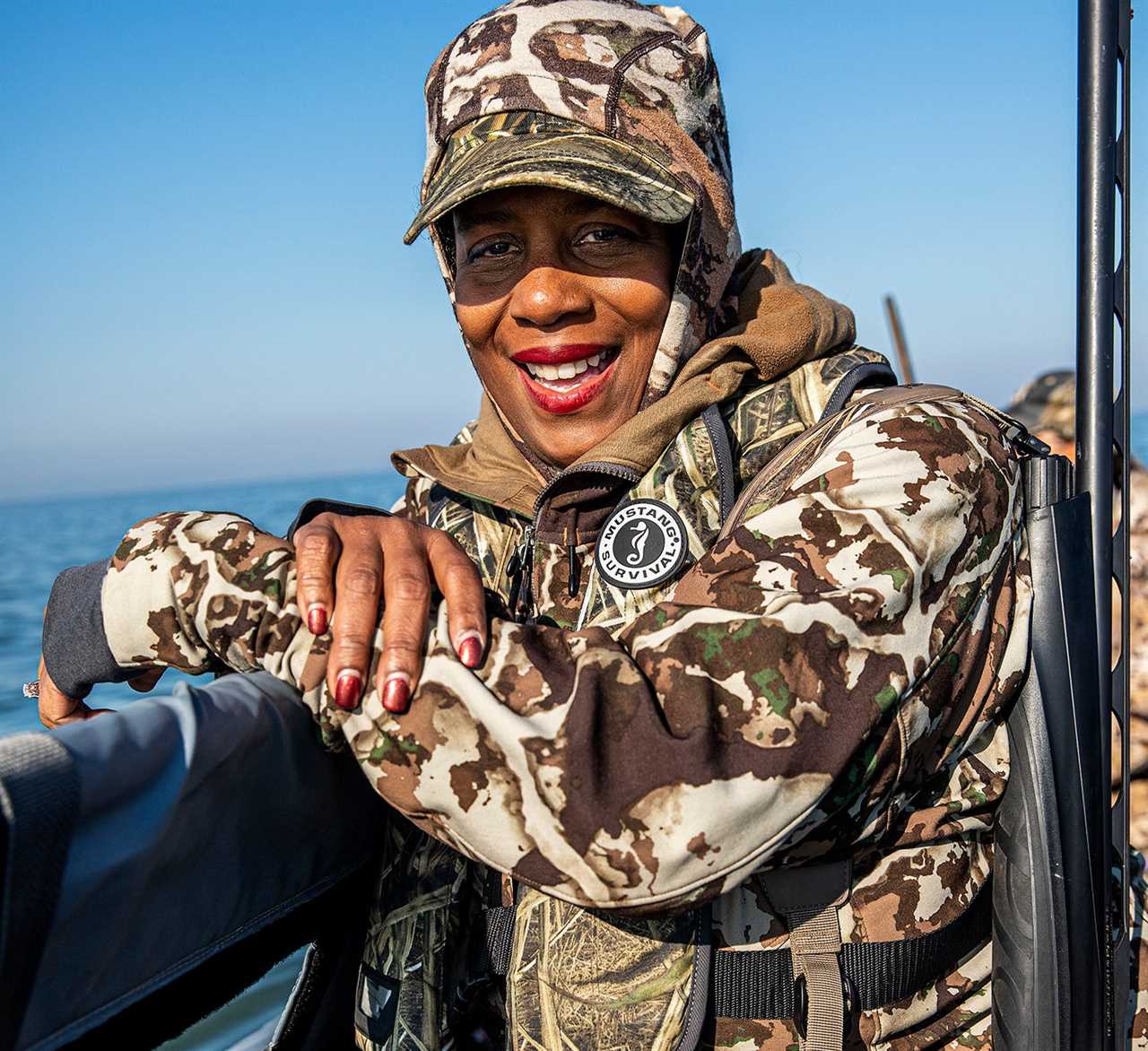
Stretching her legs during a break in the action. Tom Fowlks
And right now, she really wants to talk about her upcoming turkey hunt on land near where her dad homesteaded, north of Oakland, California, after he fled the Jim Crow South.
As the hunting industry wrings its hands over how to get more people involved in the sport, she’s the unicorn—the later-in-life Black, female hunter. She knows it. And she knows the power that comes from other Black men and women seeing her in the woods in camouflage, reclaiming a piece of her history. But first she wants to learn more about hunting and its unexpected challenges.
“I’m used to being able to succeed at things,” Mapp says. “You study for the test well enough, you get an A on the test. And hunting is not like that. You can prepare all you want, you can get right down into that moment of opportunity, and still miss. It will humble you. I don’t like to think I have a big ego, but when you’re not successful, it forces you to look at yourself and your attitude. [Hunting] has helped me humble myself in ways I couldn’t learn in other areas of my life.”
Rocky Beginnings
If Mapp had based all her future hunting expectations on her first hunt, she might never have returned.
On that day, temperatures hit nearly 100 degrees. She was in California’s Central Valley with Heyser and a friend on a dove shoot, but without a reservation, they couldn’t get on public land until noon. Heyser hadn’t told her the hunt would include miles of walking through dry and prickly star thistle and curly dock before settling down among stalks of crispy sunflowers.
“When I got there, I realized I didn’t have as much water as I needed. So the guy who was with us, he said, ‘I need water too, let’s go together to the car.’”
They took off, and Mapp realized after about an hour that they were still walking around and likely lost. She got more dehydrated while they walked.
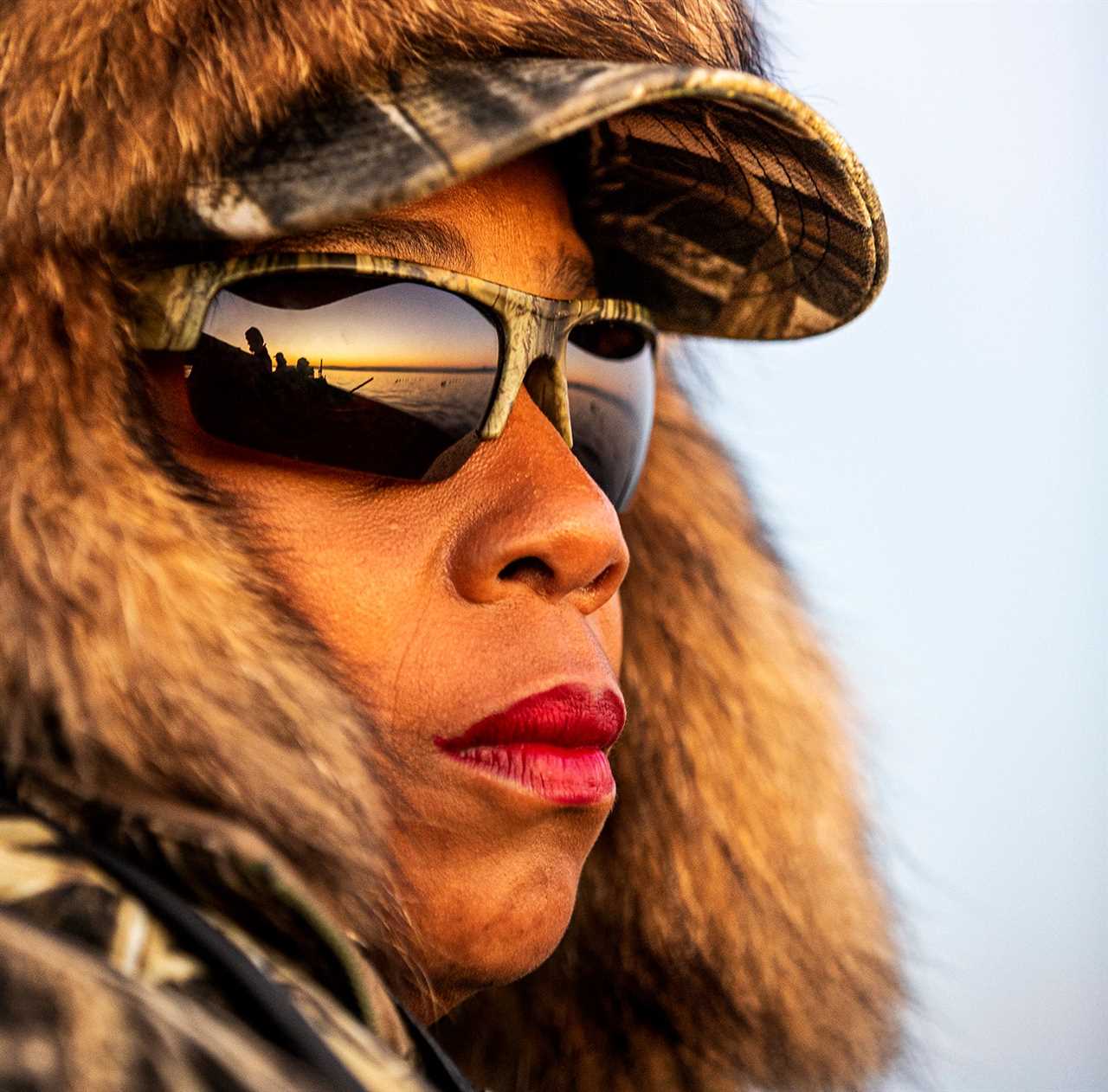
Hunting may be a relatively new personal endeavor for Mapp, but it’s one she’s had a longstanding connection with through her family. Tom Fowlks
In something of a panic, the guy finally decided to shoot three times in quick succession as a distress signal, and that only frightened Mapp more.
“I was super self-conscious in this area because I hadn’t seen any women. No Black people. Just white people with guns,” Mapp said. A fear flashed through her mind then: Someone could shoot her, and then lie that she had threatened them with her own gun. “What I realized was I had a lot of baggage around guns because I had more exposure to violence on human bodies with firearms” than in hunting scenarios.
When she was 15, Mapp saw someone shot in front of a Baskin-Robbins where she was working as an ice cream scooper. Her brother had been shot and killed. Even hearing shots at doves in the field that day made her jumpy.
Eventually Mapp and her companion found the main road and got back to the car. The guy was mortified that a simple outing had gone so awry.
“He thought Mapp was never gonna hunt again,” Heyser says.
“But that wasn’t on the table,” Mapp adds.
Mapp and Heyser tell the story in tandem, as though it happened yesterday. Since that first hunt in 2020, Heyser and Mapp have chased pheasants in Kansas, ducks across Northern California, and wild pigs on California’s Central Coast. Mapp has pursued whitetail deer and pronghorn in Wyoming and geese in Arkansas.
Black Heritage and the Outdoors
Even though she’s a new hunter, Mapp’s connection to the outdoors traces back before she was born. When her dad and mom moved to Oakland, California, in the 1940s, her dad brought with him a “yearning for country life and lifestyle.”
He bought a piece of land in Northern California that was partially developed with a house, barn, and shop. Her dad added a swimming pool and tennis court and then used the rest of the land to raise pigs and cattle, garden, and care for acres and acres of English walnut and fruit trees and grapevines. He hunted squirrels, quail, and deer and taught others how to hunt. For years, family and friends gathered for meals, parties, talent shows, and games on that land.
“My dad was living an outdoorsman lifestyle,” she says. “And I had a front-row seat for how to eat that way.”
After high school she got married, had three kids, and worked as an analyst at Morgan Stanley. But Mapp never lost touch with her upbringing—she gardened extensively, kept chickens, went camping, and took the kids on bike rides. She divorced and decided, at 35 years old with three young children, to go back to school, earning a degree in art history.
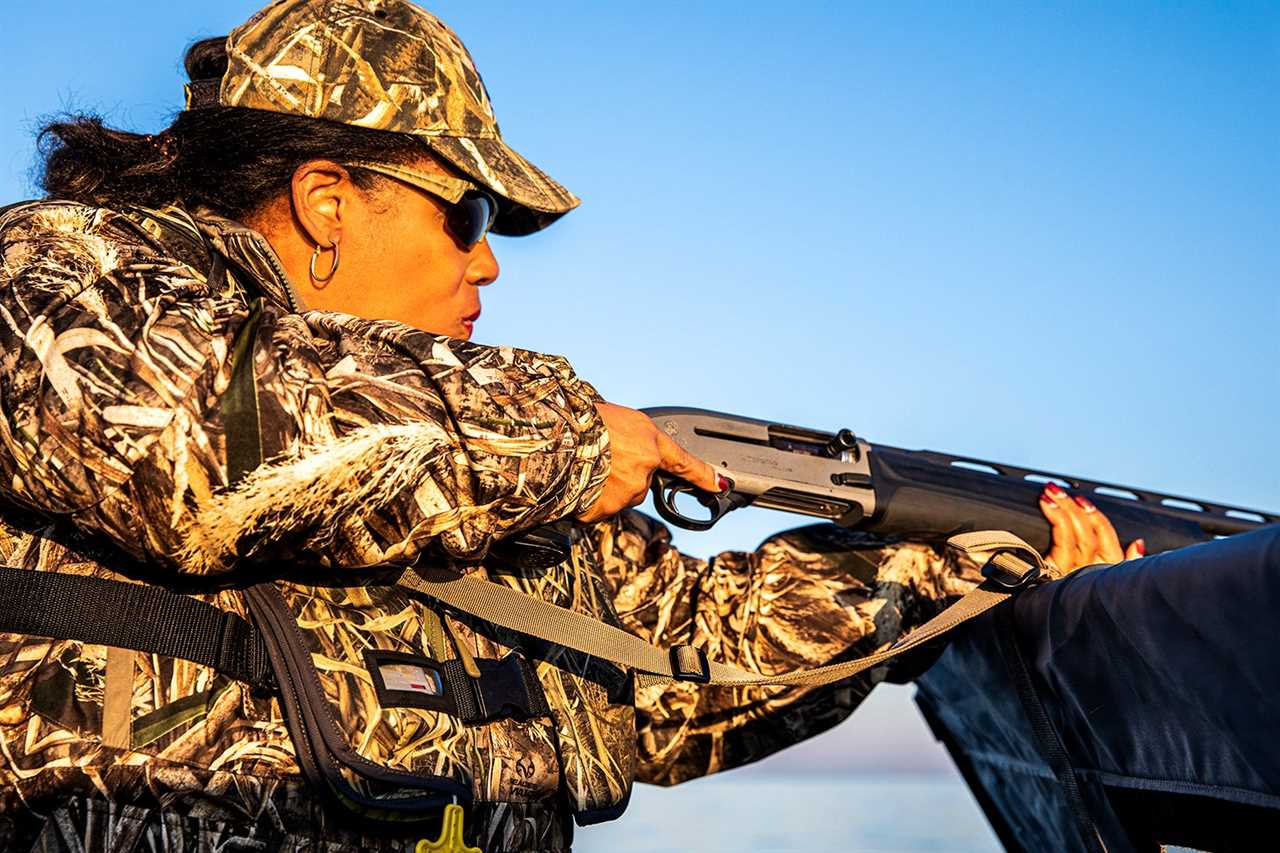
At the ready, with an eye on incoming scoters. Tom Fowlks
Then, in 2009, she knew what she was meant to do. She sat down at her kitchen table and wrote a blog post on a site she’d created called Outdoor Afro about the importance of Black joy in nature and getting more Black people outside.
“I had had all those years connected to the outdoors and the family homecoming experience, and I didn’t find it in other organizations and groups or online,” she said. “So I used my representation to tell a new narrative about Black people in the outdoors and about my life.”
Her life and background felt unique, but as she kept writing and connecting, she realized there are far more Black outdoorsmen and -women than most people acknowledge.
Outdoor Afro grew from putting on local hikes with friends and family to an audience with former President Barack Obama in the White House and conversations with conservation leaders from around the country. She trained other leaders to host hikes and outings for Black hikers, bird-watchers, and other types of outdoor enthusiasts. Now the organization offers programs in 40 states and 56 cities, with 60,000 people participating each year.
One of those hikes is how Crystal Egli got involved in Outdoor Afro. After years working for Colorado Parks and Wildlife, Egli started the Inclusive Guide, an online community supporting businesses that are safe and welcoming to people of color. She learned to hunt in 2018 and chronicled the experience in a series of videos for the agency. She now serves as a board member of Hunters of Color.
“I am used to being the only person of color in a space, and I’m used to outdoor adventures and the anxiety that goes with it,” Egli says. That’s why Outdoor Afro events were such a comfort. It’s also why Mapp has become a kind of hero to her.
But Outdoor Afro has always been focused on hiking, biking, camping, and climbing. Hunting, Mapp says, will not become a major part of the organization. Right now, hunting is something for her, and something she can use her visibility among tens of thousands of followers on social media to promote.
“If hunting ever comes into the organization as a priority, it would have to come from the participants who want it,” she says. “But my professional visibility can easily get conflated with my personal hunting journey.”
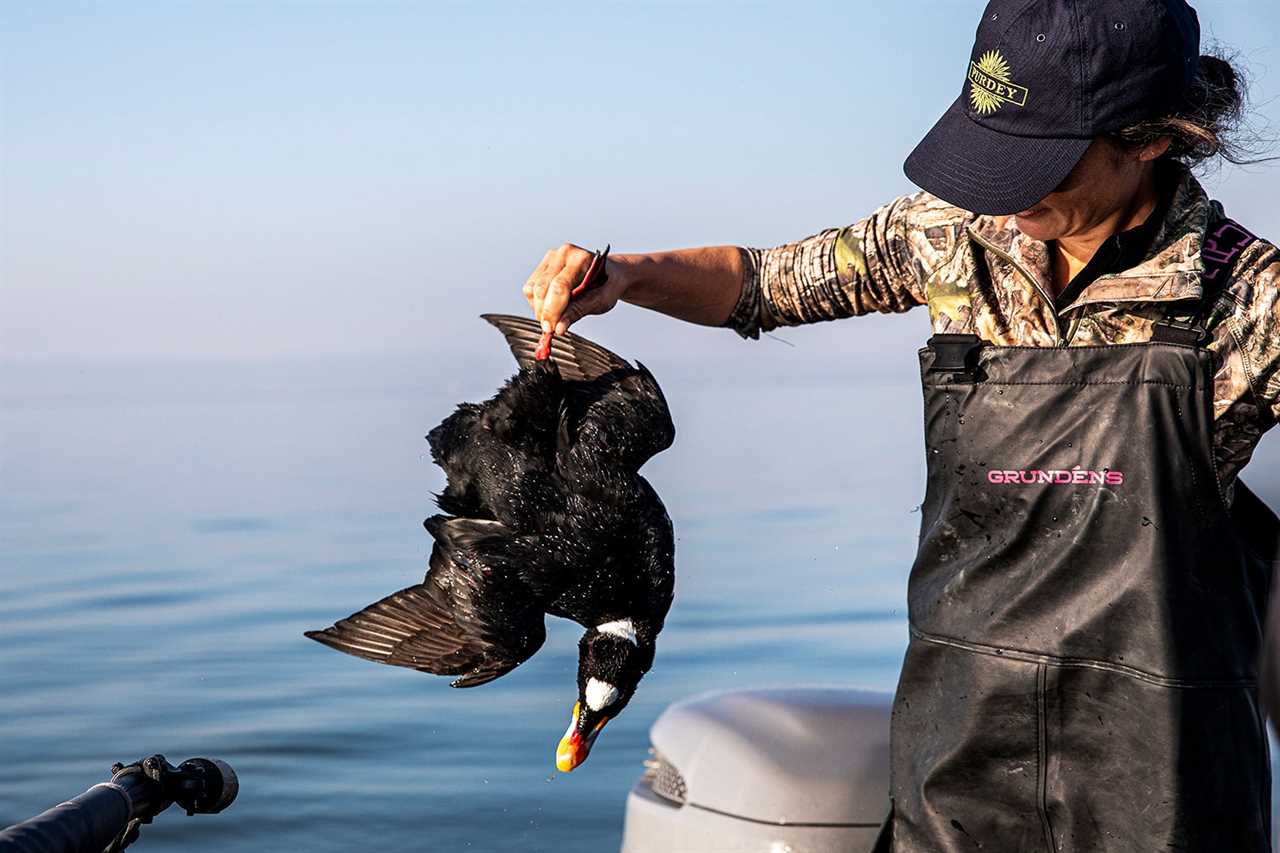
Guide Melynda Dodds pulls a nice drake surf scoter from the bay. Tom Fowlks
She acknowledges that plenty of people in Outdoor Afro won’t ever be interested in hunting.
“I have to always walk that line with respect to where people are and making sure I’m carving out my own space to process and learn and be vulnerable in my learning.”
Plus, there are already organizations like Hunters of Color and Minority Outdoor Alliance that lead with hunting as a focus.
“I would much rather throw my support behind fledgling organizations that want to launch squarely in the hunting space because there’s a lot I can share about starting an organization and sustaining it to help them succeed.”
According to the 2016 National Survey of Fishing, Hunting, and Wildlife-Associated Recreation, the best data for numbers of hunters available, 11 percent of the white U.S. population hunts. The percentage of African Americans hunting was “too small to report [the] estimate reliably.”
Far more Black people may be hunting than anyone recognizes, though, just as more Black people are outside recreating than the data often represents. It’s part of their heritage, Mapp says, especially in the South.
Egli agrees. She likes asking Black people she meets if they hunt. If they say no, often she’ll dig deeper and discover that they have hunted—they just don’t identify as hunters. During Pheasant Fest this year she asked a Black Uber driver in Omaha, Nebraska, if he hunts or had ever hunted. He said no. Then she asked if he’d ever killed an animal and eaten it.
“He said, ‘Yeah, I killed squirrels and raccoons for food.’ It’s the same with outdoorsiness. They say they don’t like to hike. But they go for walks in the woods.”
When the hunting recruitment, retention, and reactivation folks talk about growth, they need to consider how big a role hunting and land stewardship play in Black history and heritage, say Mapp and Egli. It’s why Mapp calls herself a “born-again hunter,” not a new hunter.
“In my family, people died and that hunting knowledge was lost and there wasn’t an easy way to practice it in urban areas,” Mapp says. “If people don’t have the access and opportunity, they won’t do it, but where there’s access and opportunity, people are hunting.”
It’s why in 2021 she started the Black Heritage Hunt, a small duck hunt outside Sacramento, California. She and Heyser hosted new Black hunters—including Mapp’s fiancé, who had never hunted before—for two days of hunting, meals, and fellowship.
It was similar to an Outdoor Afro event, or one of those gatherings on Mapp’s family land while she was growing up.
Beyond Politics
Despite her initial panic on that first dove hunt, Mapp says the hunting community has been only welcoming to her and has helped break down some of her preconceived notions.
Consider her hunting guide on her first whitetail hunt outside Buffalo, Wyoming. He was a 30-something, conservative white guy from Wisconsin.
“We couldn’t have been more different,” says Mapp.
They spent days together, sitting in treestands and waiting for a buck. The opportunity finally came as the sun set. The buck was about 200 yards away. She shot and the deer dropped.
“We were losing light and couldn’t see it with our naked eye,” she says. “As [my guide] got closer, he pulled out his binos then put them down and gave me a thousand-watt smile and hugged me. … There was all this joy and unity in that moment. Where the hell else could we have re-created that outside of a hunting experience?”
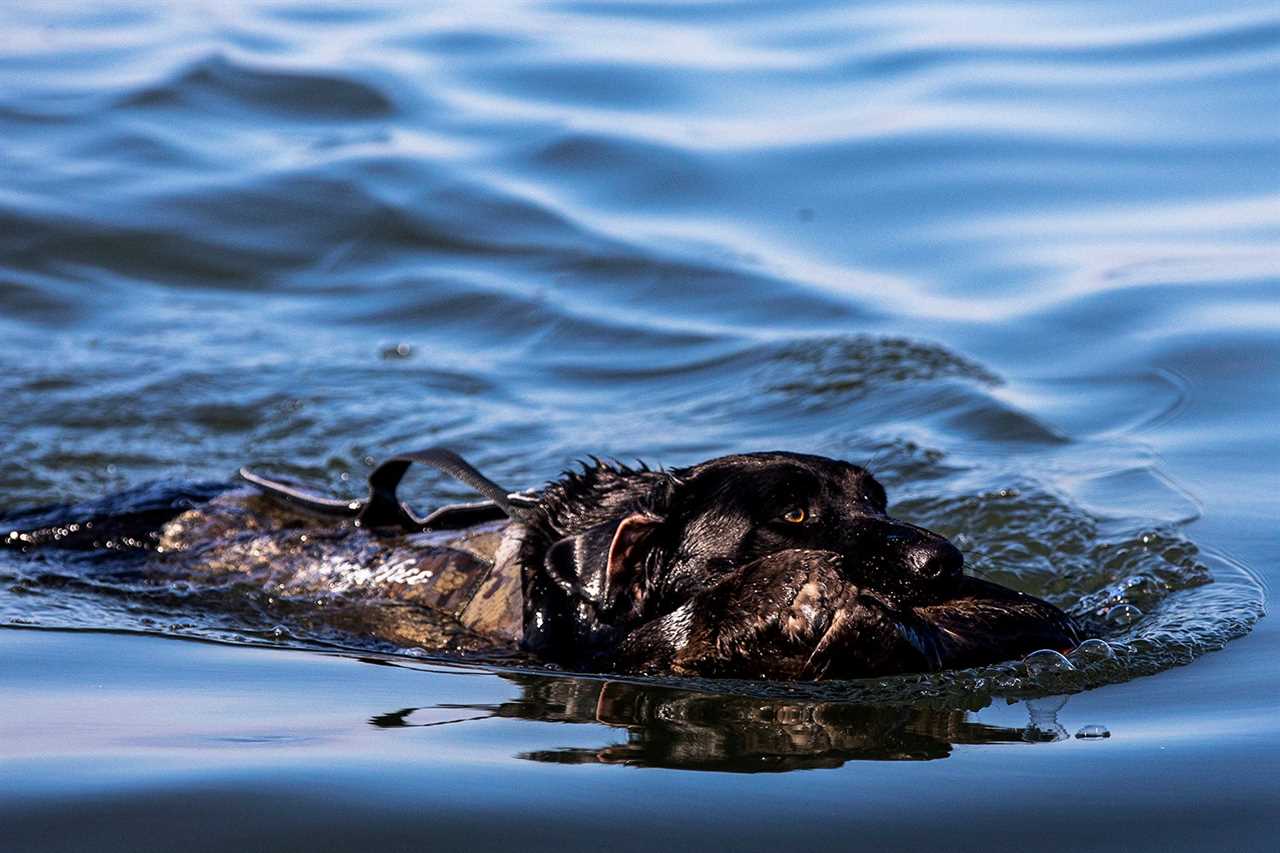
Dodds’ Lab, Nova, returns to the boat with a mouth full of scoter. Tom Fowlks
She texted a picture of her latest turkey to her guide from Wyoming’s One Shot Antelope Hunt. She knows they likely don’t agree politically, but it doesn’t matter. Hunting becomes a great equalizer.
“You go to functions [in Wyoming] and they’ll make fun of Biden, you go to functions here and they’re making fun of Trump, but it’s the same. It’s the same human condition of dissatisfaction with government,” she says. “I’ve diversified my world, and hunting has given me a chance to just get to know people.”
Hunting has also become a way for Mapp to connect even more to her food and to help those around her understand hunting. She knows not everyone is comfortable with the idea of shooting an animal to eat—she’s spent most of her life in California, where less than 1 percent of the population hunts. But she also knows food is a way to help people understand hunting and feel more comfortable with it.
“Everyone in California is super classy about their food, so it actually kind of works,” she says. “This is as free range as it gets.”
A Hunting Love Story
Back on the water on San Francisco Bay, scoters fly again, first a pair, then another single or two. The water is like glass and the sky blue, and we can see the city’s skyline, which provides a sharp contrast to our morning’s hunt. We turn back to land with six sea ducks in our boat. They will be plenty for duck jambalaya cooked for the Black Heritage Hunt later that weekend. It’s there that Mapp will go hunting on her own for the first time.
“I thought, ‘Oh wow, it feels like graduation,’” Mapp says. “I was a little afraid as I had this run-through of all the things that could go wrong.”
But nothing will go wrong. A greenwing teal will glide into her decoys and splash into the water at her shot. She’ll text Heyser a photo of the duck, the first animal that she’s killed by herself.
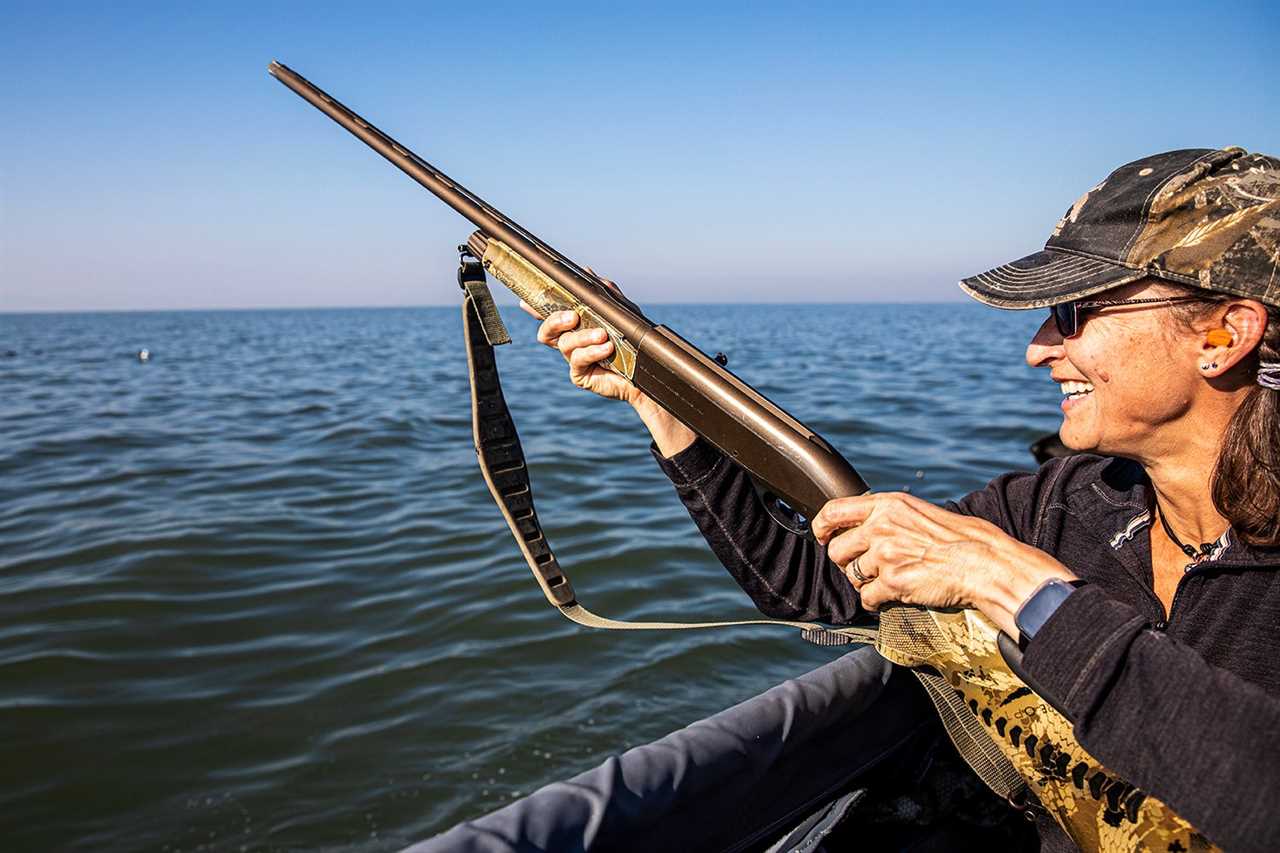
Despite the slow flights, Holly Heyser makes the most of the morning hunt with her mentee. Tom Fowlks
“There’s nothing like the quiet of the morning and rising sun, and all the creatures, species by species, wake up and create this incredible orchestra,” she’ll tell me later. “It’s great to be able to absorb all of that beauty around me by myself.”
For her, that’s what all of this—Outdoor Afro and hiking with Oprah and chairpersonships on boards and sailing to Antarctica and learning to hunt—is about. It’s about Black joy in nature.
“There’s no fight in this for me. The specificity that I’m focused on is the Black community in the U.S., but it’s not ‘Let’s fight every fight and storm city hall,’” says Mapp. “This connection to nature that I try to cultivate in people is a love story.”
This story originally ran in the Diehards issue of Outdoor Life. Read more OL+ stories.
How to Listen to Season 3 of the Outdoor Life Podcast
- Listen to Season 3, available now, on Spotify, Apple, or wherever else you listen to your podcasts. Seasons 1 and 2 are also available.
- Tune in every Wednesday for new episodes of Season 3.
The post Rue Mapp Is Learning to Hunt, But She’s Got a Bigger Mission appeared first on Outdoor Life.
By: Christine Peterson
Title: Rue Mapp Is Learning to Hunt, But She’s Got a Bigger Mission
Sourced From: www.outdoorlife.com/hunting/rue-mapp-learning-to-hunt/
Published Date: Wed, 27 Jul 2022 19:00:00 +0000
----------------------------------------------
Did you miss our previous article...
https://manstuffnews.com/weekend-warriors/the-best-410-and-28gauge-semiauto-shotguns
 Backyard GrillingWeekend WarriorsAdvice from DadBeard GroomingTV Shows for Guys4x4 Off-Road CarsMens FashionSports NewsAncient Archeology World NewsPrivacy PolicyTerms And Conditions
Backyard GrillingWeekend WarriorsAdvice from DadBeard GroomingTV Shows for Guys4x4 Off-Road CarsMens FashionSports NewsAncient Archeology World NewsPrivacy PolicyTerms And Conditions
